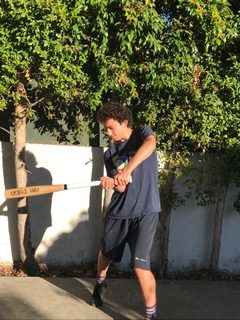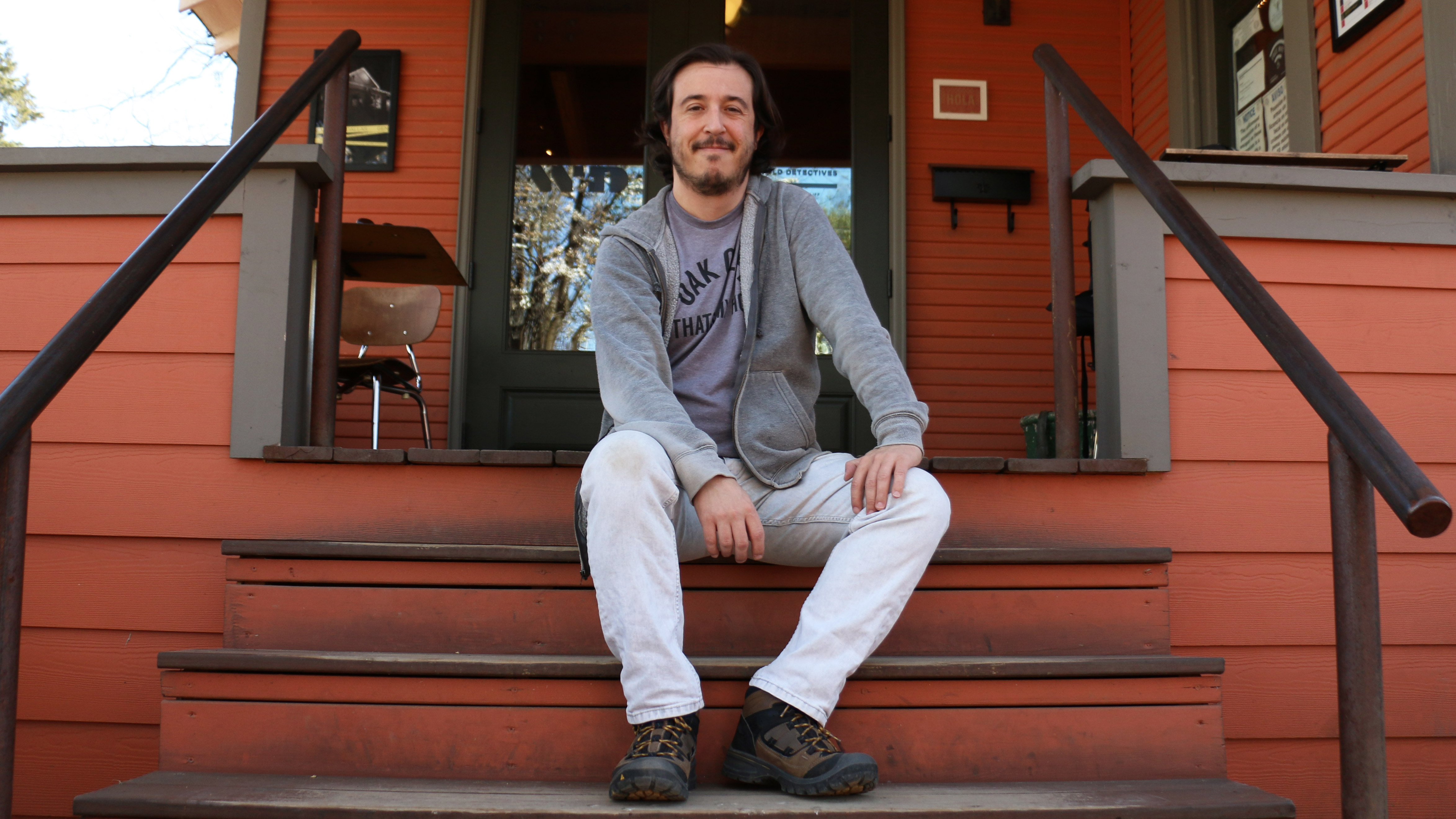 Weeks in the making, this interview with Roger Dickey is filled with inspiration and insight from one of the most creative people I’ve ever met. Roger has been writing code since the fifth grade. He sold an app company to Zynga in 2008. He is now out on his own, finding startup companies he believes can be the next big thing. He helps many with money, he helps others with advice. Roger Dickey is a man who is leaving his mark on Silicon Valley. If you have a chance to catch Roger at a conference near you, get in there, listen, take notes and heed his advice to create, create, create. Enjoy this interview. I hope you get a glimpse of Roger Dickey that you may not have seen in other interviews you’ve read or watched online. I am in the process of having an article based on this interview published, so a few of my original questions have been omitted for that reason. I’ll update this post when that article is published
Weeks in the making, this interview with Roger Dickey is filled with inspiration and insight from one of the most creative people I’ve ever met. Roger has been writing code since the fifth grade. He sold an app company to Zynga in 2008. He is now out on his own, finding startup companies he believes can be the next big thing. He helps many with money, he helps others with advice. Roger Dickey is a man who is leaving his mark on Silicon Valley. If you have a chance to catch Roger at a conference near you, get in there, listen, take notes and heed his advice to create, create, create. Enjoy this interview. I hope you get a glimpse of Roger Dickey that you may not have seen in other interviews you’ve read or watched online. I am in the process of having an article based on this interview published, so a few of my original questions have been omitted for that reason. I’ll update this post when that article is published
What kind of family raises a serial entrepreneur? Can you describe a bit about your early upbringing?
I may be an unusual case. My father is an accountant. He works for the state of Texas. My mother is a librarian. So , I kinda was brought up… I was brought up, not in a technical family, although that’s the direction I eventually went,
I did have two friends during my childhood who were influential and I sort of happened upon them by chance. One of them had a father who built the 3D engine behind the polar bears that you see in the Coca-Cola commercials. Another friend’s father was a computer science professor at University of Texas at Dallas near where I grew up. I just sort of encountered these guys and as a kid, I always liked working on projects. But genrerally that entailed taking cardboard, string and tape and glue and just putting something together. I was just always buiding something. I don’t know why I liked that. So I found computers and I just naturally gravitated toward them, because you know, the potential to build inside of a computer, to make software, is pretty much unlimited. I really found that attractive and my parents encouraged it, they were, you know, helpful, they got me a computer despite how expensive it was for the family, at a very young age. They got me connected to the internet.
Also, I was always a really motivated individual. That was another side of the coin. Once I learned about computers, for some reason, I was always doing a project. I would be up till 11, 12, 1, every night, just programming something. And I’d come into school, show it to friends. We had a friendly competition going, like who would write cooler programs, me or my buddies. I think that really helped. Aside from the sort of environment I was in and the competitive motivations I lived under, I don’t think there were too many other unique factors.
With a librarian as a mother, you’d be surrounded by books, did you love books too?
I did. Certainly. So, my mom was an insomniac as a kid, and unfortunately or fortunately, that gave her a lot of extra time and she ended up reading constantly, so she burned through almost all of the classics by the time she was 12 or 13. She’s very very well read and any well-roundedness I have, I contribute to her, anything I know outside of computers, she pretty much taught me. We would spend a lot of time together and she would read a lot of things to me and inspire me in a lot of different directions, and I also ended up reading a lot, before I encountered computers, that’s what I spent a lot of my time on. Then I was addicted once I began programming.
How old were you when you got your first computer and started programming?
Well, I started programming when I was, I think in 5th grade. I was around 10 years old. I had that friend whose father worked on the polar bear models for Coca-Cola. He had a computer and my family didn’t and one day, he was actually sick and we got on his computer and were playing around and I remember this blue screen that he pulled up at one point and he showed me some program his dad had taught him how to write, I hadn’t thought much of it but it had always been this mysterious thing to me, how did he program the computer to do something? So I got in there and I started messing with the program and made some changes and I noticed how they affected the output. I started making more changes and then I got to the point where I could add my own lines to the code. I still remember that day and my mom came to pick me up and I didn’t want to leave. I was too engrossed in what I was doing. So then, when I got home, I asked to go back the next day and the day after and I just became completely hooked from that day forward.
Awesome to have good friends like that. So you’re from Richardson or Dallas, TX?
Actually, Richardson. I grew up in Richardson, but not many people know it, but there’s a lot of tech out there. It’s not the high Silicon Valley type tech. More semi-conductors and that sort of thing.
How did you get to the University of Illinois from Texas? And Why there?
It’s the number five computer science school in the U.S. and I always knew I wanted to do computer science. Since probably junior high, I knew that was the direction I wanted to go. So I applied to all of the top six schools in computer science. The problem was that a lot of those other schools were very strong in other areas and at the time, admissions programs for universities, I recall they had a pretty heavy focus on grades and my grades weren’t bad but they weren’t top tier. I think I had a 3.6 gpa in high school. A lot of the reason behind that was that I’d go home every day and focus on computers and not studying to squeeze a few points more out of my bio exam.
That’s what a lot of these schools like Harvard and MIT, Stanford, Yale and Princeton, a lot of these guys were really looking for top tier grades. I don’t think I represented well enough on my applications, the extra-curricular work that I did. So I got rejected … I applied to seven schools and got rejected from six of them. I only got into the University of Illinois because they just looked at my SAT score which was great. So… I HAD to go there. I loved it. It was a great experience. Way better than I could have expected and a number of amazing folks who I have intersected with in various ways since then. They definitely have a very strong CS program. So I would highly recommend their CS or their engineering program to anyone.
Are there a lot of people that you went to school with at that time that are now in Silicon Valley?
Yeah, it’s funny. There’s more that sort of crop up every week. I think in the last week I was contacted by two classmates from U of I who are asking me for advice on how to apply to startup incubators or they have a company they’re trying to raise money for. A lot of those people have come out here cause Silicon Valley is a place where you can convert a strong understanding of engineering into success. I don’t think there are many other places in the U.S. to where this effect is as strong.
Since you’re the creator of Mafia Wars, I have to ask this question, did you watch many gangster or mafia movies as a kid? And which were or are now your favorites?
Great question. Of course, I like The Godfather, like anybody else. That’s definitely a classic. I’ve always liked action movies, not specifically mafia action movies, but I like all the action movies that were made in the 90s. You know, things like Con-Air, The Rock, Broken Arrow, all those ridiculously over the top action flicks with a ton of explosions. I think there was a pretty good era of those, like Lethal Weapon and Die Hard.
So if you look at the criminal organizations represented in those movies, it varies from the mafia to the Russians to some Chinese or Japanese organization that’s trying to infiltrate some business in the U.S. Some of those themes, beyond what you would traditionally see in like a mob movie, get into Mafia Wars. Especially these days, I’m not on the project any more, but I still look at some of the content that the team pushes out, and it’s essentially trying to reach a broader vision which is instead of a “mafia” theme MMO on Facebook, it’s sort of like a crime adventure thriller type of MMO on Facebook. So now it’s branched out and focusing on organizations like the Yakaza and there’s different cities and different things happening. There’s even some themes in there now that are remininscent of movies like the Bourne Identity. I definitely like all that media. In terms of what is my favorite, it’s hard to say, but I definitely like action movies.
You brought up the Bourne Identity, Matt Damon is not in the next movie. What will the Bourne franchise be like without Matt Damon?
I imagine a lot of people thought that about the James Bond Franchise whenever they switched actors. Maybe they’re looking to turn it into a kind of new school James Bond franchise. I know was always a huge fan of James Bond. I’ve seen every James Bond movie, every single one ever made, many of them multiple times. As they switched actors for James Bond, it would take me time to get acclimated to the new ones. I always liked Roger Moore, I was a huge fan of his. Then Pierce Brosnan came along and I think he just killed it. He was the perfect James Bond. Daniel Craig, it’s taken me time to get used to him, but I think I’ll get there. So I think they’ll acclimate to whoever stars in the new Bourne films.
When did you move out to Silicon Valley?
When I was running the business I sold to Zynga, it’s funny, but I only knew one person from Sillicon Valley. It was my co-founder who had moved over to Austin, Texas. I think I had been to San Francisico once, on a family trip, during high school. I really hadn’t any other occasion to go. When I first started talking to Zynga and a few other potential acquirers, I did fly out once or twice, and when I sold, I pretty much moved out immediately, but I wasn’t out there before that. It was about late march/ early April of 2008, right after the acquisition closed.
You were in Austin, TX when the move occurred?
Yes, I was. That’s where we had the small company based.
Was there a person or group of people who helped you learn the ropes in Silicon Valley? Or did someone mentor you, make introductions or was everything just Zynga at that point?
I’d say more the latter. I didn’t start to branch out as an entrepreneuer until I’d already been at Zynga for 2 – 2 ½ years. I was really heads down, trying to do the best I could on the product I was running. And really, during those two years the strongest learnings for me came through just operating a bigger team than I had before. There was a lot of learnings about leadership, organizing a team, project management, a lot of logisitics around handling a group larger than thirty to forty people, which was again a new experience. Then there were a lot of learnings in the product realm. Building products for millions of people, products that they love and resonate with and motivate them to act and come back is a skill you have to learn.
I spent a lot of my time learning product. Zynga was also like my MBA. I never had an MBA, I had always been an engineer. I learned everything I know about business while I was at Zynga and through some subsequent angel investing I did, where I had to engage with more businesses than I ever did before, albeit, in a pretty minor way. Really, Zynga was all of those things for me in terms of personal learning. In terms of building a network, I went out after running products for a little over two years at Zynga, I went out to Japan to help build the product function for our Japan studio. After returning from there, that’s when I really started to network a lot.
In Silicon Valley, why do people keep trying after initial failures?
People talk a lot about failure in the entrepreneurial community. There’s a lot of books about it. There’s even a conference about it called FailCon that I spoke at recently. I think people talk almost too much about failure. It’s something to understand and not be afraid of but I don’t think it deserves as much attention as it gets.
Effectively, by the time someone comes out to Silicon Valley and decides to start a business, generally, they already have a number of accolades, they have sort of gathered throughout their life, things they’ve achieved, trials they’ve overcome, outside of the business realm. So, within the business realm, I think in a lot of ways, business isn’t hard it’s just different than what a lot of people are used to doing and it requires tireless focus and energy which a lot of people don’t want to allocate to their profession. You know, some people kind of want something where they can come home at 5 or 6, have kids at an earlier age, have a dog, watch TV and that’s great, that’s fun. I think that’s enjoyable for a lot of people or maybe they have other personal projects.
A lot of the entrepreneruers I know, for whatever reason, they really just want to kill it, no matter what, at some venture. People I know who are motivated that way, tend to understand it’s something they have to do at all costs. So failure is essentially, just a step along the way. Being an entrepreneur is about tireless persistence, that’s persistence through success or through failure.
I hear so much about failure, especially from Silicon Valley folks, it seems like it’s a word that can almost be played out. If you could use a different term for failure, would you coin a new term, what would it be?
Well, a friend of mine, Adam Smith, who I have a ton of respect for, has a great blog where he talked about a study that McKinsey or maybe it was Wharton out of Pennsylvania did on entrepreneurs where they tried to find a common factor between successful entrepreneurs. So they looked at everything, trying to find correlations like what GPA did they get in high school? Were they an Eagle Scout? Did they go to a top tier university? Did they get an MBA? And the most common factor they could find between people was they really have this, like, again, getting back to this tireless persistence, they have this factor that he calls GRIT, which is, through tough times, and through long hours and working weekends, and years and years of trying to succeed at what you’re doing, you have to just keep going, he calls that GRIT.
So you don’t have to be super intelligent to succeed or go to a good school or have an MBA, but I think, rather than focusing on the negatives on how people handle failure or whatever other term you want to use for that, I think having the ability to transcend all of that and keep going is where I like to focus. So the term for that is GRIT which I like.
What drives you to succeed? Is it pride in doing a good job? Your creativity? Your desire for money? A higher power? If you could point to one thing that provides you with that GRIT what would it be?
I would rephrase that as, “What motivates me?” One thing that motivates me is… the biggest thing is probably… I don’t know how to phrase this…. To a degree, I’m competitively motivated. I have friendly competitions with friends. But, I’ve just always had this fundamental wellspring of motivation. I see this space of business and startups as a game, to a degree, with looking at it from a Zynga perspective, and it’s a game I really enjoy playing. I like the other players. I like people I’m playing the game with. I like my competition. I like the process of building products that millions of people see and scaling and hiring and you know helping people succeed in their careers. Everything down to going out with a co-founder to find office space, all the little details of it, I really enjoy. Like I said, I’ve always enjoyed creating things. When I was a kid, I might take the box the new fridge came in and build a fort out of it. Now, it’s working with staff and building products and having a bunch of servers on Amazon, you’re just able to create, but at a much larger scale. So, I guess I just like building things. And that’s what motivates me, it’s creating. It’d be my religion if I had one. I’m not a religious person. So really, that’s what moptivates me, doing something I love and I want to keep doing it.
How long have you been angel investing?
It’s been about two years now. I started when I was able to sell some Zynga stock. One of the first things I did was buy a bunch of stock in Facebook.
How do you buy stock in a company that is not public? I guess there is a private market for stock. (asked before the Facebook IPO)
Yes. There were two major websites where you could by private equity in hot startups. One was called SharesPost and the other was secondmarket.com. I think they’re still around. But to a degree, that market has dried up because a lot of the major players have adopted schemes where they don’t allow employees to sell stock, so that’s now baked into a lot of employment agreements meaning in the future these guys won’t have supply to match with their demand. Facebook, although it’s going public now, as of two years ago, they didn’t allow people to buy stock, Zynga didn’t allow employees to sell stock. A lot of that’s dried up. That’s one approach. Another approach is if you have a big enough network , go to someone you know well and try to get them to sell you stock. Maybe do some favors for the company and see if they’ll get you in on the next round. It’s complicated but if you understand the business, and you know the players involved, there’s certainly ways to get yourself in.
You’ve been an angel investor for a number of companies, can you name a couple that my readers should be aware of?
I’ve got a list of companies, some you may recognize. Of course Facebook. There’s a company that got a lot of press on TechCrunch a while back called Addepar. They’re sort of like a mint.com for high net worth individuals. There’s another company called DotCloud. They’re like a platform as a service solution like for launching solutions in the cloud. There’s another company called E la carte. They have this LCD screen based solution that sits on tables in restaurants and lets you buy little up sell items like drinks and desserts.
Is E la Carte being used in many restaurants now?
I think they’re in 400 restaurants and in the process of expanding. They’re trying to work with chains to get into more restaurants. Really smart team. I think they’re going to go far.
I’ll add one more company. They’re called One School. They make mobile applications for college students , enabling them to track notes, get campus information, like events, bus routes, course schedules, class locations, that sort of thing, They’re doing very well on IOS right now.
You have an advisory role in 500 Startups, how involved do you get with that advisory role?
In the case of 500 Startups, they have a program called 500 Mentors, where there’s a directory of mentors that companies in the 500 Startups network can reach out to of their own volition. I’ve been reached out to by several companies in the 500 Startups network. It ranges anything from my taking one meeting or phone call with them, talk through what they are doing, figure out what the problem is and see if I can help to companies that come to me and would like me to formally join their advisory board. I’ve been on both ends of the spectrum. Right now, I’m on four or five advisory boards. I have a pretty full schedule, in terms of advising and I’m trying not to take on too many more companies. I do more of the casual advisory stuff at this point.
For people with new startups, how legitimate are the fears of their ideas being stolen outright or maybe incorporated into a project by people they’ve talked to in Silicon Valley or by anyone else?
Great question. A lot of people will go stealth because they have that concern. I think it depends a lot on the market you’re getting into. For example, if you’re really trying to disrupt a market that’s dominated by big companies, let’s say you’re trying to build the next Google Docs. There aren’t a lot of small companies in that space. If Google finds out what you’re going to do, it’s not like they will turn their team around and copy your idea. So you can share your idea broadly without much risk. But if you’re trying to do something in a space that has a ton of small companies, approaching the same problem, that also move fast, that have similar characteristics to yours, it’s probably prudent not to blab about it in context where these people may hear about it and go after what you’re doing.
It’s generally best for a startup to stay stealth, unless you a reason to do otherwise. If there’s a reason that PR is valuable to you. Or if there’s a reason it makes sense to throw a launch party, like to start hiring for example. Then, yeah, come out of stealth. Otherwise, there’s no good reason to come out of stealth outside of discussing what you are doing with a few trusted friends, which I would always recommend people do.
The Product X you are working on right now, I presume it is in the stealth phase right now.
Yes, and it would be for the reasons I mentioned. Not that we’re doing anything we’d consider really secretive or that we have to keep under wraps. It’s just that we haven’t had a reason to come out of stealth yet. Until then, we won’t.
So you won’t share any details today ? (laughing)
I can’t unfortunately. I could share briefly what we’ve been up to for the last few months. But probably shouldn’t share where we’re currently at. We’ve been in the ideation or a brainstorming phase, whichever term you’d like to use, for the past four months.
In the brainstorming process, if someone has the next million dollar idea, does someone need a million dollars first to create it, or can great ideas be formed on a shoestring budget? What would you suggest to someone who has a great idea but does not have the money to pursue their project?
Raising money can be difficult, especially for first time entrepreneuers. I generally recommend to just learn about business in a more risk free manor. Find a business you can run that starts generating cash quickly. One of the most difficult things for an entrepreneur especially when it comes to hiring or getting any kind of leverage beyond themselves is having money they can put forth to get that leverage.
So if you go after a Twitter type idea where it’s, “We’re going to build this thing and we might be profitable within six years.” Then, that’s not a good business for a first time entrepreneuer. For example, you have some trick to find a good engineering candidates or designer candidates, then you can have a subscription service that recruiters pay for that, you can maybe have recruiters paying you $100.00 a month each, you bring on 20 recruiters, you’re making $2000 a month. You just hit it home and work on this project. You can run a consulting business like that or something that’s a little easier to do. Once you do that, then I always recommend that people see if they can find sources of capital, folks you can raise money from and test the waters there. If you can raise money, then see if you can go after something bigger. If not, maybe you have to stay small until you build up your own nest egg.
So creating apps or having some type of subscription service might be best for bringing money in immediately?
Yeah, apps can immediately start making money. My first business that really took off was a facebook apps business. It eventually led to me making Facebook games which eventually led to the Zynga acquisition. At first, we were just building these apps that subsisted on ad revenue. Sometimes we’d make $10.00 a day, around $4000 a year which wasn’t enough to support ourselves. But we then eventually got an app making $100 a day, got it up to $200 – $300 a day. Then we launched the game , that did much better?
Was that Dope Wars?
That was Dope Wars, yeah. With Dope Wars we found some core mechanics that really resonated with people. It was fun. They liked the theme. And we already understood how to sell advertisements. Once we got people just essentially hitting more pages to play the game, everything started to multiply quickly and we were making thousands of dollars a day.
What were some of your other early apps before Dope Wars?
We tried a bunch of things. Around Christmas 2007 we had all these holiday themed applications which actually got us a lot of traffic which we then rolled into other projects. We had some social games, when I mean social games I mean they were around specifically your friends. You’d take your friends and dress them up in funny outfits or give them nicknames, things like that. We had something that was vaguely dating related. We had a few social utilities like a tool you could use to get connected to people that were two or three degrees away. We were just all over the map. We tried everything. It was 2007 right after the platform launched. People didn’t understand it. Nobody knew what would work.
What software or platform would you recommend to someone who is just now starting out to make some apps? Is there something from Adobe or is there some software to use that wouldn’t be overly expensive in order to create apps?
There’s a plethora of tutorials online for making IOS applications, Android applications or Facebook applications. If I have to look at those platforms, IOS and Android, pretty much everything on mobile requires more advanced distribution techniques than Facebook does, you tend to have to buy traffic or use other tricks to get people to find your applications. You’re beholden to the ad networks on mobile. In the case of facebook, if you make something that’s fun and catches on, it can go viral. That’s what I’d recommend as a starting point for entrepreneuers who want to build apps. Facebook. Distribution can be easier, it can be free and you can learn a lot about building products there, you can learn a lot about scaling, about technology, all the things you’ll need to know to succeed in mobile or elsewhere. That’s essentially where I learned how to build internet products, was on the facebook platform. There’s a number of good tutorials on that and actually the facebook website itself, the facebook developer website has some good tutorials and a really good reference and there’s also a vibrant forum community around starting apps.
What final words do you have to inspire the next generation of game creators and the next generation of serial entrepreneuers?
To game creators, I’d say find or start a company that aligns with your vision for how to delight users. Do work you’re proud of. Video games are the new games, and they’re here to stay. To future entrepreneurs, I’d say embrace a love of learning & never give up. Measure yourself against giants. If you do this you will win.
Do you prefer cats or dogs? (I saw that a cat also works for Product X)
Both, but right now prefer cats. Tough one!
Finally, what’s your favorite beer and pizza?
Hefeweisen. As for pizza, stuffed crust pizza from Pizza hut. Easy 🙂
If you’ve enjoyed this interview with Roger Dickey, please leave a comment below or share the interview with your friends or colleagues.
More on Roger Dickey
LinkedIn
AngelList Profile
rogerdickey.com






